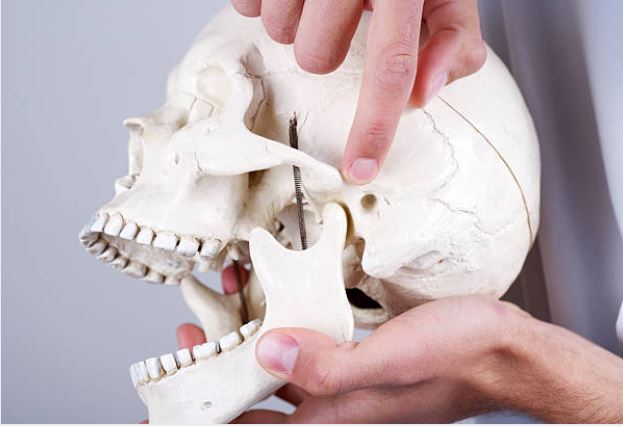
Many people are unaware of what TMJ disorder is, but they have probably experienced the pain that it can cause. The temporomandibular joint (TMJ) is a hinge joint connecting the jaw to the skull, and we use it to open and close our mouths, chew food, and talk.
Pain in this area occurs when there is inflammation or damage to tissues surrounding the TMJ like muscles, nerves, and ligaments. This blog post will help you understand TMJ disorder better and give you some tips on how to relieve your pain from TMJ disorder without popping too many pills.
Understanding Jaw Pain, TMJ, and TMD
Pain in the jaw and face is often a result of TMD or temporomandibular disorder. This syndrome occurs when there are problems with masticatory muscles (muscles that help you chew), teeth, and TMJ joints.
Some of the common temporomandibular disorders include:
- Arthritis
- Dislocation
- Injury or infection of the TMJ
- Ringing in the ears
- Headaches
- Clicking and locking in the jaw
Some people temporarily experience TMD, but others may have to deal with this syndrome for the rest of their lives.
Best Ways to Alleviate Pain from TMJ Disorder
Treating TMJ pain is not as easy as popping a few pills or taking aspirin now and then. In fact, over-the-counter medications may exacerbate your problem. Since these pills don’t treat the root cause, they only worsen your condition.
The best way to treat TMJ pain is by treating the cause or causes first and then following up with a natural treatment plan. For less severe cases, you can manage TMJ pain without the need for surgery. Some of the best ways to ease TMJ pain include:
Maintaining the Relaxed Position of the Jaw
One of the ways to alleviate pain from TMJ disorder is to maintain the relaxed position of your jaw. You want to avoid large muscle movements, clenching your teeth, and excessive grinding.
Do your best to keep your mouth as relaxed as possible. If you’re having trouble avoiding excessive grinding or clenching your teeth, your TMD Treatment Somerville specialist may recommend a bite guard. This is a device that will help to protect your teeth and keep them in the correct position.
Be Mindful of Your Sleep Positions
Improper sleep positions can also aggravate TMJ pain. It’s best to sleep on your back and ensure adequate support for your neck. If you’re a side sleeper, make sure to keep your head and neck in line with your spine and avoid placing your hand on your jaw.
Use Heat and Cold Therapy
Hot and cold compresses also go a long way in relieving TMJ pain. Applying a hot compress to the area for five minutes can help loosen up any tight muscles and improve blood flow. Follow up with a cold compress for one minute to reduce inflammation.
Jaw Exercises
Jaw exercises improve your jaw mobility and can help relieve pain. Perform five reps of the following exercises twice a day:
- Relaxed jaw exercise: Rest your tongue gently on the roof of your mouth, just behind your upper teeth, and allow your teeth to come apart, making sure your jaw remains relaxed.
- Chin tucks: Begin by pushing your shoulders back and chest up. Next, slowly tuck your chin backward, creating a double chin. Hold the position for three seconds and repeat for at least five reps.
- Resisted mouth opening: Place your thumb under your chin and open your mouth slowly, pushing your thumb against your chin to create resistance. Hold for three seconds, then close your mouth and repeat.
- Side to side jaw movement: Put a 1/4 inch object between your front teeth and move your jaw from side to side. Increase the thickness of the object as the exercises become easier.
To get the most out of these exercises, it’s crucial to do them regularly. Also, don’t expect to feel instant results. Be patient as it takes time to feel significant improvements.
Massage Therapy
Massaging the jaw muscles can also help alleviate pain. Ask your TMD Somerville specialist or physical therapist about specific massage techniques you can use at home.
Yoga and Stretching
Stretching your neck, jaw, and face muscles can also help reduce tension and pain. In addition, yoga poses targeting these areas, such as the cat-cow pose and downward dog, also reduce stress and tension in the muscles.
Wrapping Up
TMJ disorder can be a frustrating condition to live with, but there are many ways to alleviate the pain. You may find relief from your symptoms by trying some of these methods.
If the problem persists or gets worse, consider seeing a Dental Care Massachusetts TMJ specialist. A specialist will provide you with a more in-depth and specialized treatment for TMJ disorder. Call us at (617) 623-8489 or (781) 395-0300 contact us at First Dental to schedule your appointment today.
